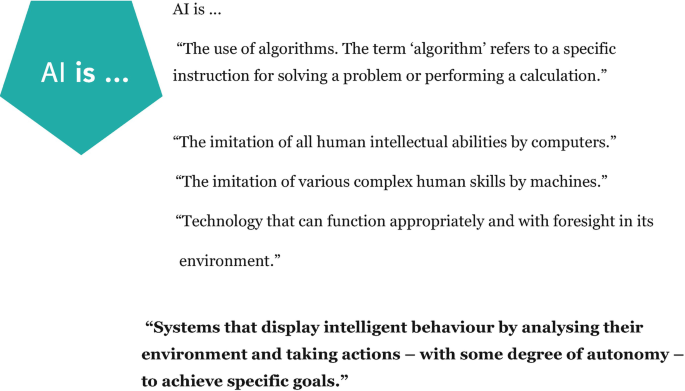Artificial Intelligence (AI) Library Guide
- AI Home
- AI Tools Toggle Dropdown
- Using AI tools effectively
- Prompt Strategies Toggle Dropdown
- Ethical Use of AI Toggle Dropdown
- Citing generative AI
- Further reading
- AI Seminar Toggle Dropdown
- FAQ's
AI Literacy Framework
The AI Literacy Framework created by Dr. Kara Kennedy based on the UNESCO Digital Literacy Global Framework.
What is AI?

Figure: "Various definitions of AI". Adapted from Sheikh, H., Prins, C., Schrijvers, E. (2023). Artificial Intelligence: Definition and Background. In: Mission AI. Research for Policy. Springer, Cham. https://doi.org/10.1007/978-3-031-21448-6_2
What is AI Literacy?
AI (Artificial Intelligence) literacy is most commonly defined as “a set of competencies that enables individuals to evaluate AI technologies critically; communicate and collaborate effectively with AI; and use AI as a tool online, at home, and in the workplace” (Long & Magerko, 2020). AI literacy, consists of knowing, understanding, using, and evaluating AI, as well as considering the ethical issues (Ng, et al, 2021). Leo S. Lo (2025) defined AI literacy as the ability to understand, use, and think critically about AI technologies and their impact on society, ethics, and everyday life. This broad definition encompasses several interconnected components, each essential for developing a well-rounded understanding of AI. According to Lo (2025) the components of AI literacy include an emphasis on technical knowledge, ethical awareness, critical thinking, practical skills, and societal impact, encourages a deeper understanding of AI.

Table: "Definitions of AI Literacy". Adapted from Hervieux, S., & Wheatley, A. (2024). Building an AI literacy framework: Perspectives from instruction librarians and current information literacy tools. Choice. https://www.choice360.org/wp-content/uploads/2024/08/TaylorFrancis_whitepaper_08.28.24_final.pdf
Bibliography
Lo, L. S. (2025). AI Literacy: A Guide for Academic Libraries. College & Research Libraries News, 86(3), 120-122. https://doi.org/10.5860/crln.86.3.120
Long, D., & Magerko, B. (2020). What is AI literacy? Competencies and design considerations. In Proceedings of the 2020 CHI conference on human factors in computing systems, 1-16. https://doi.org/10.1145/3313831.3376727
Ng, D. T. K., Leung, J. K. L., Chu, S. K. W., & Qiao, M. S. (2021). Conceptualizing AI literacy: An exploratory review. Computers and Education: Artificial Intelligence, 2, 100041. https://doi.org/10.1016/j.caeai.2021.100041
- Last Updated: Nov 10, 2025 2:28 PM
- URL: https://libguides.cut.ac.cy/ai_guide
- Print Page

